This year marked a significant increase in business formations, aligning with observed trends since the peak of the COVID-19 pandemic. But newly-formed businesses face a disadvantage in accessing financial products, as there’s limited data available for financial providers when conducting due diligence. Middesk facilitates instant B2B onboarding by providing comprehensive insights into a business’s risk profile, enabling streamlined, high-quality decisions, and helping our customers save time and money by introducing automation. In this update, we'll cover 2023 business growth trends, industry insights, and recent Middesk product developments.
Observed business growth trends in 2023
Annual new business applications in the U.S. have more than doubled over the past 3 years, reaching a record-setting 5.4 million in 2021 and 5.1 million in 2022, with the Census reporting 5.1 million business applications in 2023 so far, expecting a slight increase over last year's numbers.
The U.S. Chamber of Commerce attributes this surge to entrepreneurs rising to the occasion to meet pandemic-induced economic needs, with retail and professional services experiencing the most notable growth. Widespread layoffs led many individuals to embrace entrepreneurship by turning their hobbies into at-home businesses or offering private consulting services.
The surge in new business formation poses a challenge for financial institutions to meet customers’ onboarding expectations while maintaining regulatory compliance standards, as regulators have continued to increase scrutiny of compliance programs in 2023.
This year, Middesk experienced significant year-over-year growth in Business Verification volume, but more than twice as much year-over-year growth in Order volume, reflecting increased desire by financial institutions to have specific information about a business at distinct moments in the customer relationship. Of the total growth in Business Verification volume, nearly one-third represented businesses formed within the past year. In this section, we share some additional insights on this SMB growth.
Age distribution of businesses
In 2023 we saw a significant number of new businesses submitted by our customers, with 30.1% of all submitted businesses less than one year old, and 30.9% of submitted businesses between 1-5 years old.
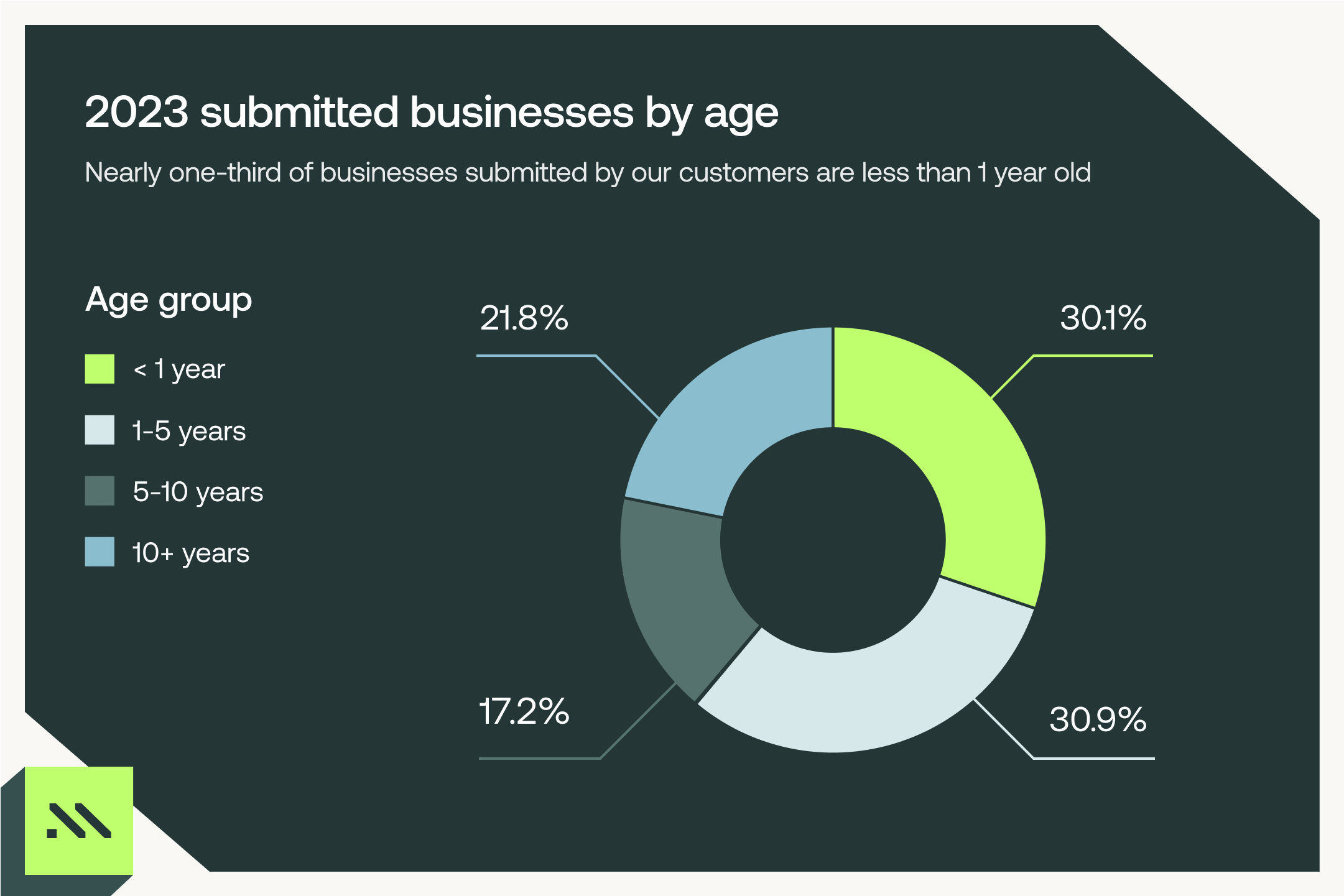
Of these newly-formed businesses, nearly one-third were formed within a month of submission, and nearly a quarter were formed between 1 and 3 months, suggesting that many businesses seek access to financial services within the first 30 to 90 days of formation.
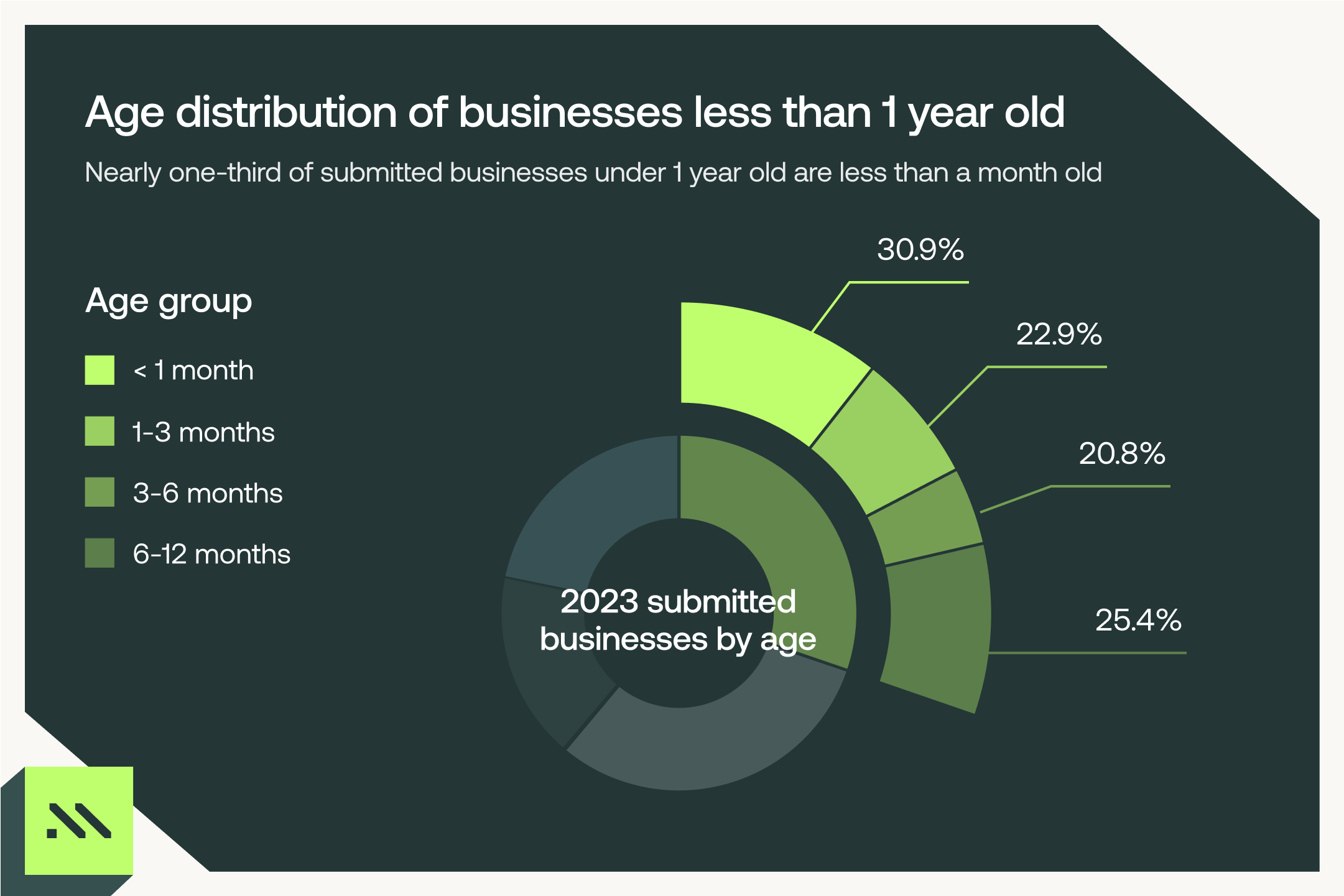
The majority of businesses in our full database are well-established, with nearly three-quarters of businesses existing for over 5 years and 58.4% of businesses being 10 years or older, while those less than a year old comprise just 4.6%.
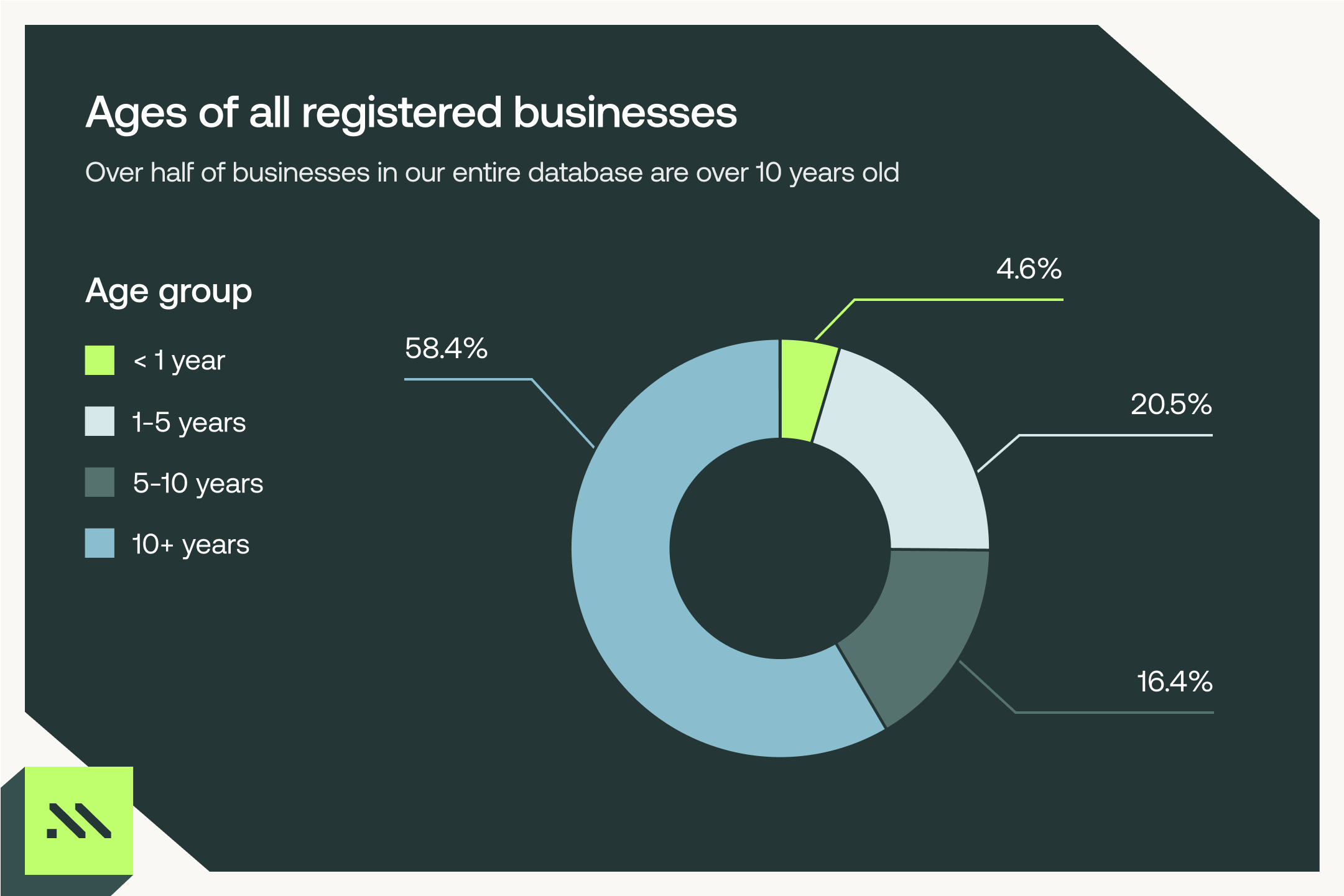
Businesses formed within one month of submission are the most challenging to auto-approve; however, auto-approvals typically increase as a business ages beyond the 3-month mark. Middesk has helped customers boost their auto-approval rates as much as 87% and improve top-of-funnel acceptance.
Entity types of U.S. registered businesses
The vast majority (nearly 70%) of business entities submitted to Middesk in 2023 were LLCs (typically the most popular legal structure for new businesses), further representing the growth of small businesses in recent years.
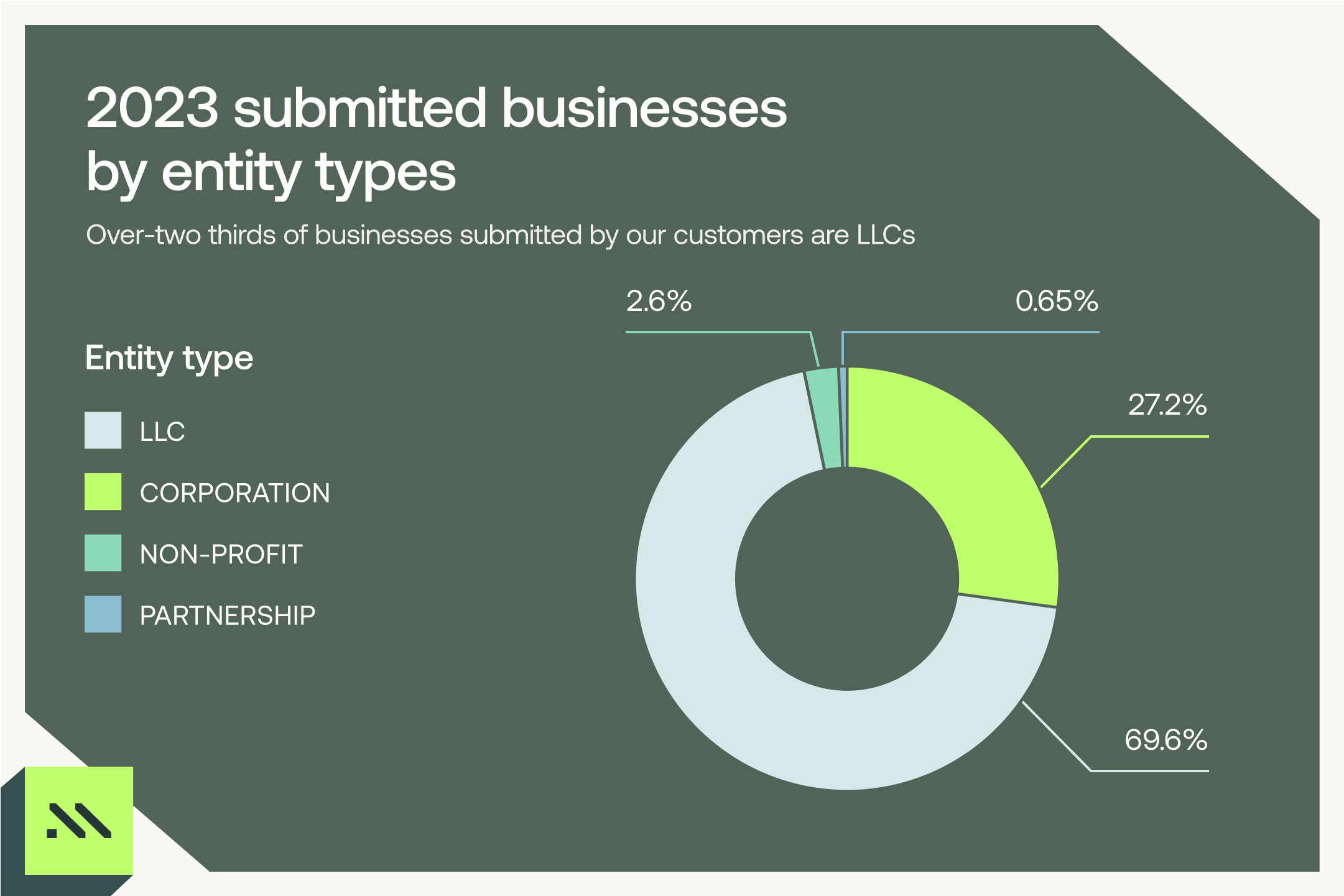
When we compare this year to all registered businesses we have in our database, LLCs only make up around 52%. We are proud to have delivered very strong verification performance on LLCs for our customers over the past year.
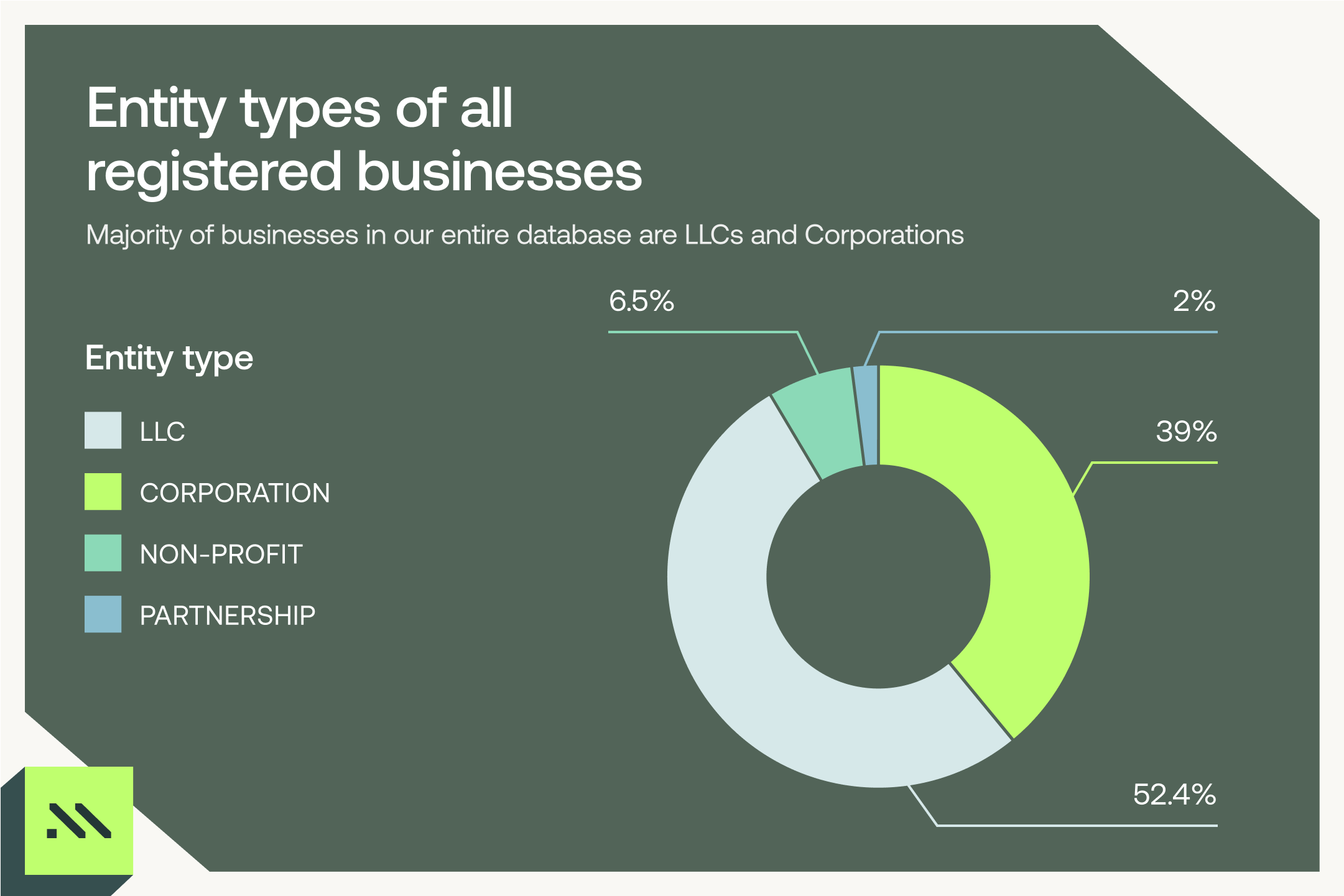
Map of business operations by state
The top 5 states for primary business address are California (12%), Florida (11.1%), Texas (9.7%), New York (5.7%), and Georgia (5.2%). While Delaware and Wyoming remain popular states to file a corporation in for tax purposes, our data shows that many SMBs operate locally in highly-populated states.
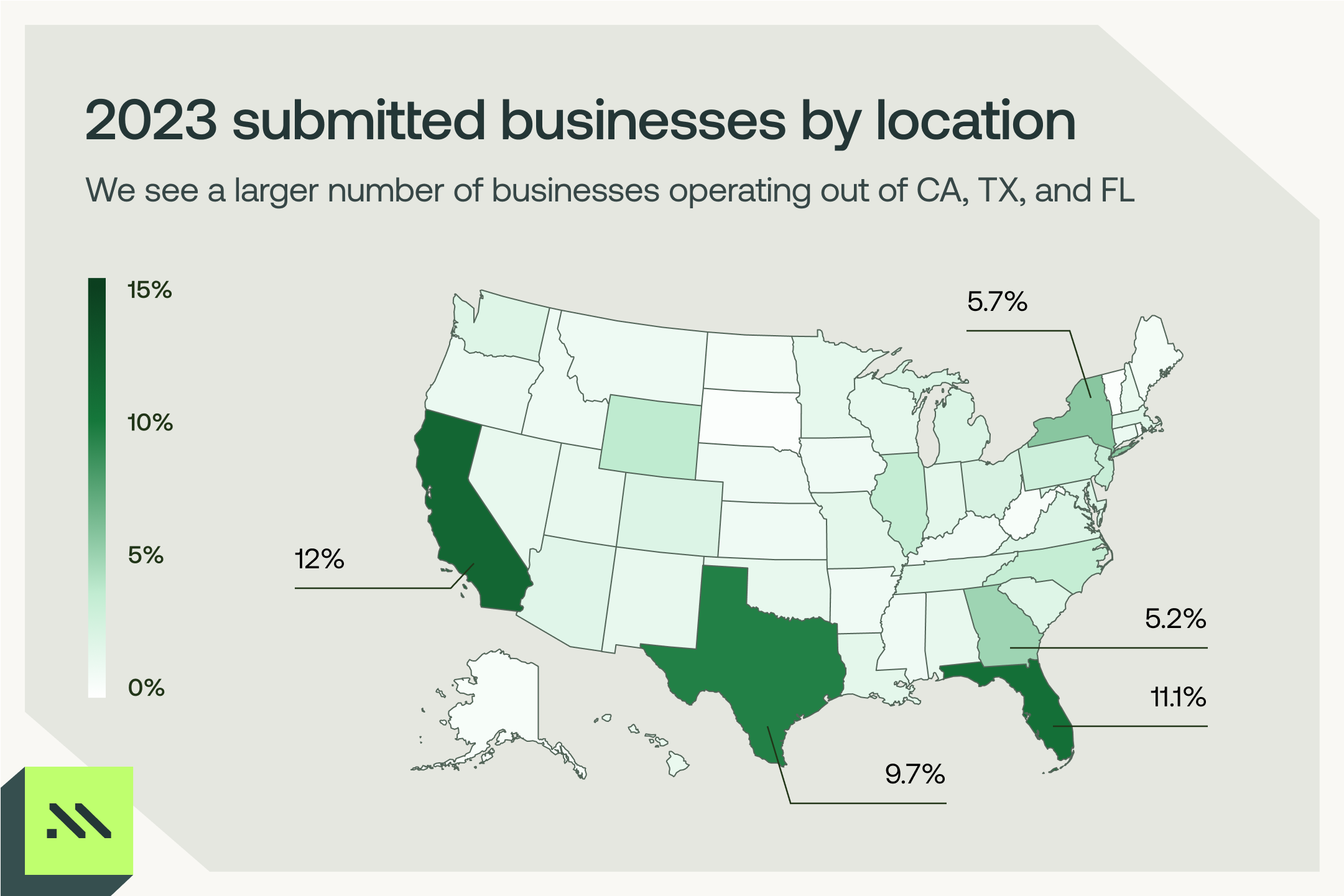
Businesses by industry
The top North American Industry Classification System (NAICS) industries for businesses submitted by our customers in 2023 included Professional, Scientific, and Technical Services (18.1%), Retail Trade (15.5%), and Manufacturing (12.8%), followed by Construction and Other Services, reaffirming the trend of small businesses operating locally to serve their communities.
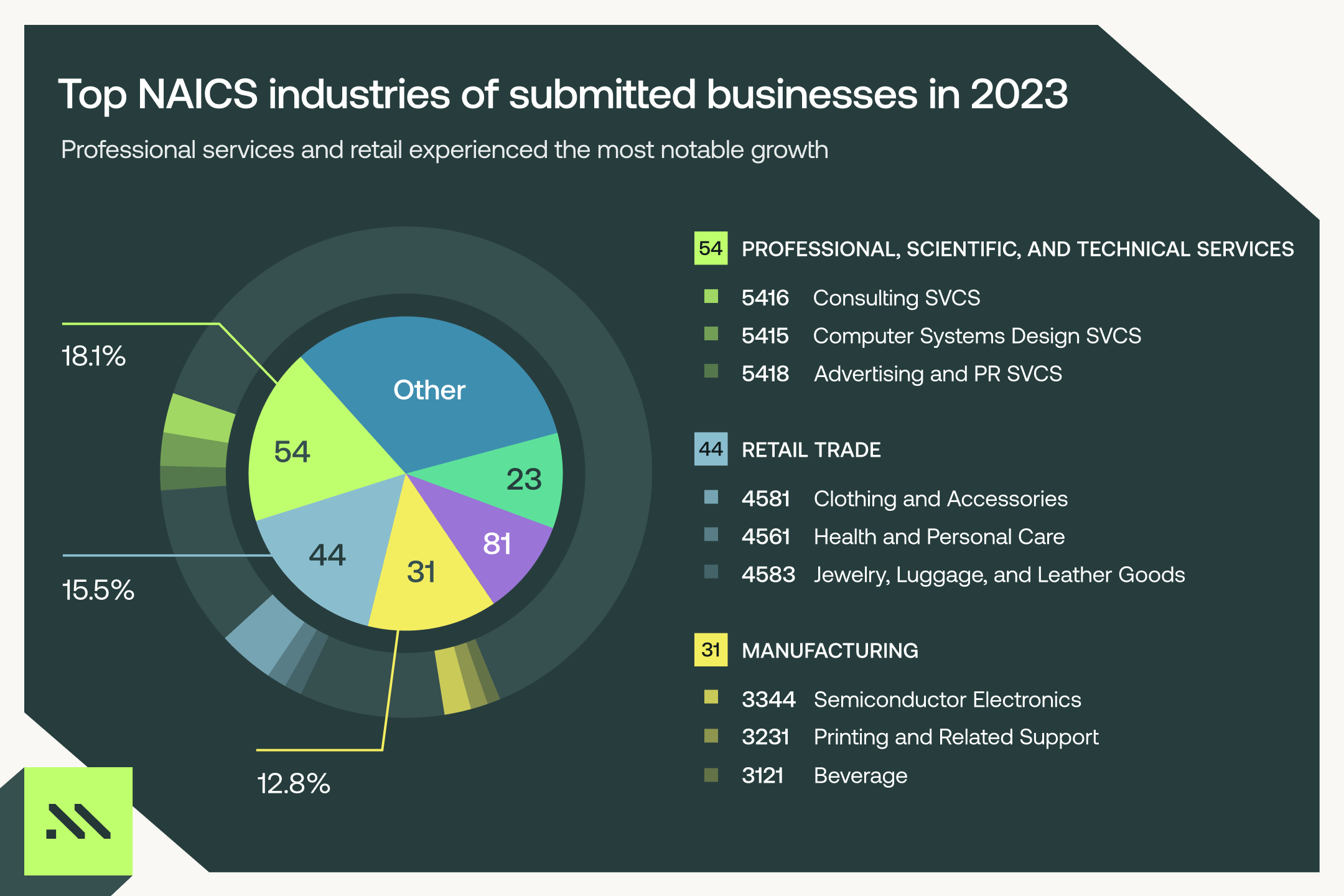
New business formations over the last 10 years
We observed the most business formations in 2021 and the fewest in 2013, with a significant bump in business formation from Q2 of 2020. Since then, we see that more businesses are formed in the first half of the year, with January, March, August, and October standing out as popular months to start a business throughout a year.
.png)
Industry trends: The impact of a tech banking crisis
In March, the news of Silicon Valley Bank’s collapse rocked the tech sector, in what is now considered the biggest banking collapse since 2008. Following a 40-year legacy serving venture capital firms and startups, SVB succumbed to a bank run in just 48 hours. In the same week, New York-based Signature Bank and Silvergate Bank in California faced FDIC takeover and closure, respectively. While concerns of a larger banking crisis have diminished, some important takeaways emerged for the financial services industry.
Speed matters when it comes to onboarding
In the wake of SVB’s collapse, minutes mattered: thousands of startups needed to open new accounts and move their money quickly. Opening a business account with an incumbent bank typically takes 1-2 weeks, but many innovative fintechs provide more streamlined onboarding experiences, serving as a powerful differentiator.
Many of the banks and fintechs serving SVB’s former customers chose to partner with Middesk, which provided us with unique insights on B2B growth trends. Following the crisis, we observed notable differences in changes to volume between traditional banks and fintechs. Traditional banks saw a 0-5% increase in their normal volume, while the fintechs saw a 50-75% increase in volume–a clear indicator that when searching for a new bank, most startups preferred the speed and convenience provided by fintechs.
Fintechs that were able to respond with grace under fire and onboard new customers quickly set new volume records following SVB’s collapse. In a time of crisis, every minute counts–business owners need to trust that their money is safe and that they can continue serving their customers.
The truth is, minutes always matter in business banking; businesses are increasingly drawn to speed and experience in financial products. Middesk facilitates seamless onboarding for B2B financial providers across a variety of industries, including traditional banks and fintechs.
Risk management as a growth lever in fintech
Another key takeaway from the collapse of Silicon Valley Bank was the need for financial institutions to regularly re-evaluate risk. SVB’s collapse may have been avoidable had they risk-adjusted their assets earlier, but as clients feared instability and withdrew funds, this effectively caused a bank run.
In the weeks that followed, many financial institutions saw heightened scrutiny from regulators, and both investors and sponsor banks sought to de-risk their portfolios. Amid scarce venture capital funding, startups shifted focus from rapid growth to sustainable profitability.
It’s important to note that neglecting compliance in favor of cutting overhead costs raises significant risks, given the heightened regulatory attention. In fact at Money20/20 this year, ‘Compliance Matters’ emerged as a core theme, emphasizing the need for ongoing risk mitigation and adaptable policies.
Read our report on KYB for every stage of a business for advice on building a strong compliance program and using it as a competitive advantage.
Building trust between businesses remains critical
Trust is critical in the world of finance, but in the wake of a tech banking crisis, it can feel as though trust is scarce. As Simon Taylor notes in Fintech Brain Food, “The ultimate rug pull is when trust is shattered about money.”
Businesses need to trust that their money is safe with their bank. Banks need to trust that their customers aren’t going to defraud them or abuse their platform to facilitate financial crime.
The wave of fintech innovation over the past decade has expanded access to financial services for underserved segments, challenging traditional financial institutions. Striking a balance between avoiding risk and embracing innovation is crucial, as overly cautious approaches may be seen as exclusionary. Businesses are looking for a bank that can promise both trust and a superior experience, emphasizing the need for financial providers to stay agile, adapt to emerging risks, and respond quickly to customer concerns.
The good news is that many leading fintechs are well-positioned to solve these challenges, while banks have access to greater capital and resources that enable innovation. Financial institutions of all sizes can unlock growth through serving higher-risk customers by looking to data science to build a more comprehensive understanding of risk.
At Middesk, we believe that building trust between businesses accelerates economic growth, so we’ve built a network of identity and risk management products to break down the barriers that inhibit small business growth.
Product enhancements in 2023
Given the rapid growth of new business creation, we’ve aligned our 2023 product roadmap to help our customers establish trust quickly and create more efficiency in their workflows.
This year, we've invested in our data infrastructure and introduced new products to establish trust between businesses at scale. Our latest releases aim to streamline compliance processes, adapt to evolving regulatory demands, boost automation, and provide customizable solutions for your organization's unique needs.
Here are some noteworthy improvements to our data pipelines and platform:
- In Q1, we added new primary data sources, such as NPPES NPI Registry data, to increase coverage of HIPAA-covered entities and improve address match rates (docs).
- In Q2, we added 1.35M newly-formed businesses through our pipelines to Secretary of State data and increased our address coverage by 2 percentage points to improve our customers’ auto-approval rates.
- In Q3, our team revamped our machine-learning models to improve our ability to match business names and office addresses – resulting in a 1.3% boost in auto-approval rates.
- In Q4, we launched Adverse Media, a product that screens the internet for negative news related to a business and its associated people to help customers automatically identify high-risk entities.
Read on for more details on some of the key product enhancements we’ve made in 2023 to improve B2B relationship management and workflow efficiency for our customers.
Policies for workflow automation (see Q1 Changelog, Q3 Changelog)
Policies allows you to build custom rules to automatically approve businesses, order additional information, and assign tasks to analysts to streamline onboarding. Workflow triggers can be based on specific insights or business status outcomes, and you can configure multiple Policies to save time on manual reviews (docs).
Read more about how one of our customers, Checkr, saved hundreds of thousands of dollars in engineering and customer support costs by implementing Policies.
SOS sub-status (see Q1 Changelog)
Customers have greater visibility into a business’ Secretary of State standing with sub-status details surfaced in the dashboard and API, and a new optional SOS domestic sub-status insight (docs). You can now apply the sub-status results for the domestic registration to your Policies to further reduce risk and enforce compliance requirements (docs).
Document Retrieval (see Q1 Changelog)
Retrieve documentary evidence such as Articles of Incorporation and Certificate of Good Standing to verify a business, reducing back-and-forth requests with your customers. Document Retrieval saves you and your customers valuable time searching for documents (docs).
Simplified dashboard + Monitoring UI (see Q2 Changelog)
Our redesigned dashboard enables you to easily place Business Verification orders on a new business or add orders to an existing business. All orders will be grouped together under the business’ “Orders'' tab for an easy audit trail and more efficient workflows. Real-time insights from Subscriptions have been moved to the Monitoring tab in the dashboard for ongoing compliance.
People bankruptcy search (see Q3 Changelog)
In addition to returning comprehensive bankruptcy data on businesses, you can now retrieve bankruptcy data on individuals. By submitting their full name and the last 4 digits of their SSN, you’ll be able to retrieve the individuals’ bankruptcy data via API. Get in touch with our team to start using the beta product (docs).
Verify entity types (see Q3 Changelog)
You can now submit a business ‘entity type’ (Corporation, LLC, etc.) via API to verify whether the business name and entity type match the information on a business’ SOS registration to improve business name match rates (docs).
Reordering (see Q3 Changelog)
Reverify a business via the dashboard and API to ensure they are still in compliance. You can also reorder bankruptcies, liens, TIN, and adverse media screening, making it easier to refresh your understanding of that business (docs). To enable reordering, reach out to your Account Manager.
Adverse Media (see Q4 Changelog)
Use Adverse Media to screen for negative news related to a business and its associated people in order to identify potential involvement with financial crimes. Adverse Media searches the internet in real-time for news and media sources, and determines the sentiment, risk category, and overall risk level of each source. Get in touch with our team to start using the beta product (docs).
Monitoring (see Q4 Changelog)
Monitoring allows you to automatically detect changes to SOS filings, watchlists, and bankruptcies, choose which businesses to monitor, and customize your notifications. Stay in compliance by keeping tabs on changes with each customer (docs).
And soon, you’ll be able to perform comprehensive screening against U.S. and international watchlists, sanctions, and Politically Exposed Persons (PEP) lists for a business and its associated people to reduce financial crime exposure. Middesk’s data capabilities and customizable configurations allow you to select only the watchlists that are in scope for your organization and specify your risk tolerance, reducing false positives. Keep an eye out for the launch of Enhanced Screenings and other product developments coming soon!
A look forward
Financial institutions face challenges in conducting due diligence on newly-formed and thin file small businesses. Approximately half of small businesses lack substantial credit history, complicating the assessment of their financial background and reputation. The shift to digital banking has enticed more opportunistic fraudsters, who avoid leaving a paper trail that could be traced to poor credit history or illegal activity. The rising threat of SMB fraud limits growth potential, with 47% of B2B companies citing a 4% average annual loss in revenue due to fraud. Potential indicators of fraudulent businesses–such as limited financial history and lack of online presence–often resemble characteristics of legitimate new businesses with thin credit files. To add to this, many legacy KYB solutions rely on aggregated third-party data, making it difficult to obtain accurate information on newly-formed companies. Middesk’s direct access to IRS and SOS registration data helps financial providers optimize for new customer growth and approve more businesses. For instance, a leading fintech lender boosted their auto-approval rate from 40% to 75% after switching to Middesk.
In 2024, Middesk intends to further invest in helping newly-formed small businesses and the financial institutions that serve them by leveraging our best-in-class identity data. There’s a few ways we may approach this:
- Developing intelligence and workflow orchestration tools on top of our market leading identity data. We’re committed to developing intelligence tools that bolster our primary datasets to help customers streamline business onboarding and monitoring decisions with confidence.
- Building stronger ties between the business and its associated people to make onboarding decisions using early risk indicators at the top of the funnel and fight fraud throughout a customer’s lifecycle.
Roadmap review
If you’re interested in being a development partner on our 2024 roadmap, please let us know.
Have questions or feedback?
If you’re an existing customer, reach out to your Account Manager. If you’re new to Middesk, you can contact our sales team to learn more.
Check out our documentation on API Changes and Release Notes to stay up to date on technical updates to our API.
All Middesk services are subject to the Middesk Terms of Service. Beta services may be subject to additional terms and conditions.






